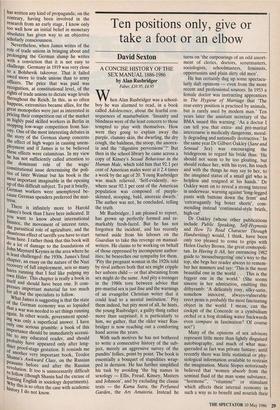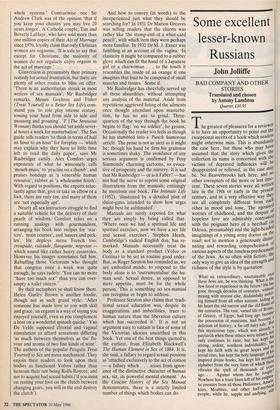Ten positions only, give or take a foot or an
elbow
David Sexton
A CONCISE HISTORY OF THE SEX MANUAL 1886-1986 by Alan Rusbridger
Faber, £10.95,
When Alan Rusbridger was a school- boy he was alarmed to read, in a book called Adolescence, about the fearful con- sequences of masturbation. 'Insanity and blindness were of the least concern to those tempted to play with themselves. How were they going to explain away the purple, clammy skin, the dwarfing, the dry cough, the baldness, the stoop, the anorex- ia and the "digestive perversions"?' But then in the school library he came across a copy of Kinsey's Sexual Behaviour in the Human Male, which told him that 92.1 per cent of American males were at it 2.4 times a week by the age of 20. Young Rusbridger was much relieved. 'Self-evidently, no- where near 92.1 per cent of the American population was composed of purple- skinned, stooping, bald, anorexic dwarfs.' The author was not, he concluded, telling the truth.
Mr Rusbridger, I am pleased to report, has grown up perfectly formed and re- markably fresh-faced. But he has not forgotten the incident, and has recently turned aside from his labours on the Guardian to take this revenge on manual- writers. He claims to be working on behalf of those oppressed by incompetent author- ities; he beseeches our sympathy for them. 'Pity the pregnant woman in the 1920s told by rival authors both that sex might cripple her unborn child — or that abstaining from sex might do the same. And pity a teenager in the 1980s torn between advice that pre-marital sex is just fine and the warnings of an evangelist Christian writer that it could lead to a mental institution.' Pity them indeed, but pity most of all, he hints, the young Rusbridger, a guilty thing rather more than surprised; it is particularly to him, we gather, that the older wiser Rus- bridger is now reaching out a comforting hand across the years.
With such motives he has not bothered to write a consecutive history of the sub- ject, merely an aggressive survey of the pundits' follies, point by point. The book is essentially a bouquet of stupidities wrap- ped in derision. He has further simplified his task by avoiding 'the big names in sexology — Ellis, Freud, Kinsey, Masters and Johnson', and by excluding the classic texts — the Kama Sutra, the Perfumed Garden, the Ars Amatoria. Instead he turns on 'the outpourings of an odd assort- ment of clerics, doctors, scoutmasters, sociologists, schoolmasters, feminists, opportunists and plain dirty old men'.
He has certainly dug up some spectacu- larly daft opinions — even from the more recent and professional sources. In 1953 a female doctor was instructing apprentices in The Hygiene of Marriage that 'The rear-entry position is practised by animals, but is rarely used by modern man.' Ten years later the assistant secretary of the BMA issued this warning: 'As a doctor I can tell you that extra- and pre-marital intercourse is medically dangerous, moral- ly degrading and nationally destructive.' In the same year Dr Gilbert Oakley (Sane and Sensual Sex) was encouraging the bridegroom to regard his bride thus: 'He should not seem to be too gloating, but should reduce her, with his eyes, his touch and with the things he may say to her, to - the imagined status of a small girl who is helpless and resigned at his hands.' Dr Oakley went on to reveal a strong interest in underwear, warning against `long-legged pants with buttons down the front' and 'extravagantly big boxer shorts', com- mending instead 'continental-style briefs, high-cut'.
Dr Oakley (whose other publications include Public Speaking, Self-Hypnosis and How To Read Character Through Handwriting) would, I think, have been only too pleased to come to grips with Helen Gurley Brown, the great cosmopoli- tan. In Having It Ali, her entrancing 1982 guide to `mouseburgering' one's way to the top, she begs her reader always to remem- ber her manners and say: 'This is the most beautiful one in the world . . . This is the biggest one in the world.' (She seems sincere in her admiration, emitting this dithyramb: 'A delicately rosy, silky-satin, somehow innocent, always-vulnerable erect penis is probably the most fascinating object in the world. I mean, can the cockpit of the Concorde or a cymbidium orchid or a frog drinking water backwards even compare in fascination? Of course not!') Many of the opinions of sex advisors represent little more than lightly disguised autobiography, and much of what mas- queraded as fact was private fantasy; until recently there was little statistical or phy- siological information available to restrain the imagination. Marie Stopes notoriously believed that 'women absorb from the seminal fluid of the man some substance, "hormone", "vitamine" or stimulant which affects their internal economy in such a way as to benefit and nourish their whole systems.' Contrariwise one Sir Andrew Clark was of the opinion 'that if you keep your chastity you may live 20 years longer'. A Catholic couple, Tim and Beverly LaHaye, who have sold more than one million copies of their Act of Marriage since 1976, loyally claim that only Christian women are orgasmic. 'It is safe to say that except for Christians, the majority of women do not regularly enjoy orgasm in the act of marriage.'
Conversion is presumably their primary remedy for sexual frustration, but there are plenty of other routes to bliss on offer. 'There is an authoritarian streak in most writers of sex manuals', Mr Rusbridger remarks. Messrs Gochros and Fisher (Treat Yourself to a Better Sex Life) com- mand you 'to role play intense ecstasy, tossing your head from side to side and moaning and groaning'. T (The Sensuous Woman) thinks you should 'set aside sever- al hours a week for masturbation'. The Sun guide tells readers 'to think in terms of half an hour to an hour' for foreplay — 'which may explain why they have so little time left to read the daily paper', says Mr Rusbridger cattily. Alex Comfort urges exponents of what he winsomely calls 'mouth music' to 'practise on a thumb', and praises bondage as 'a venerable human resource', rubber as 'a wholesome fetish'. With regard to positions, the experts reluc- tantly agree that, give or take an elbow or a foot, there are only ten, and many of their' are 'not especially apt'.
Nearly all sex instructors struggle to find a suitable vehicle for the delivery of their pearls of wisdom. Comfort relies on a running analogy with gourmandism, arranging his book into recipes for 'star- ters', 'main courses', and 'sauces and pick- les'. He deploys menu French too: croupade, cuissade, flanquette, negresse — which sound like rather heavy casseroles. However his images sometimes fail him. Rebuffing those Victorians who thought that congress once a week was quite enough, he says rudely: 'You can no more "have too much sex" than you can over- empty a toilet cistern.'
By their metaphors ye shall know them. Helen Gurley Brown is another foodie, though not in such grand style: 'After someone has made love to you with skill and grace, an orgasm is a way of saying you enjoyed yourself, even as you complement a host on a wonderful spinach quiche.' Van De Velde supposed clitorial and vaginal stimulation to afford sensations differing 'as much between themselves as the fla- vour and aroma of two fine kinds of wine'. The authors of the popular Penguin Treat Yourself to Sex are more mechanical. They enjoin their readers to look upon their bodies as functional Volvos rather than bemoan their not being Rolls-Royces; and not to acquire bad sexual habits Cif you insist on resting your foot on the clutch between changing gears, you will in the end destroy the clutch'). And how to convey (in words) to the inexperienced just what they should be searching for? In 1931 Dr Marion Greaves was telling readers that the clitoris was rather like 'the stump-end of a whist-card pencil', with which item they were perhaps more familiar. In 1932 Dr M. J. Exner was fumbling at an account of the vagina: 'In elasticity it might be compared to a rubber glove which can fit the hand of a Japanese girl or a charwoman . . . to the touch it resembles the inside of an orange if one imagines that fruit to be composed of small muscles and tissues.' Some if.
Mr Rusbridger has cheerfully served up all these absurdities, without attempting any analysis of the material. Aside from repetitious aggrieved listing of the ailments once thought attendant upon masturba- tion, he has no axe to grind. Three- quarters of the way through the book he begins to flag: 'on we soldier', he groans. Occasionally the reader too feels as though he has stumbled into a Punch humorous article. The prose is not as alert as it might be; though his hand be firm his grammar is sometimes shaky. The avoidance of any Serious argument is confirmed by Posy Simmonds' charming cartoons, so evoca- tive of prosperity and the nursery. It is sad that Mr Rusbridger — or is it Faber? — has not had the nerve to reprint some original illustrations from the manuals; enticingly he mentions one book, The Intimate Life (1952), 'illustrated by a detailed plan of sluice-gates intended to show how urges might best be sublimated'.
Manuals are surely exposed for what they are simply by being called that. 'Where once we had a spiritual life and spiritual exercises, now we have a sex life and sexual exercises', Stephen Heath, Cambridge's radical English don, has re- marked. Manuals necessarily treat the body as a standard product (Volvo or Cortina) to be set in routine good order. But, as Roger Scruton has reminded us, we are embodied minds; to respond to the body alone is to Instrumentalise' the hu- man soul. Sexual desire, as opposed to mere appetite, must be for the whole person. This is something no sex-manual can recognise or begin to address.
Professor Scruton also claims that 'tradi- tional sexual education was, despite its exaggerations and imbecilities, truer to human nature than the liberation culture which has succeeded it.' It is not an argument easy to sustain in face of some of the Victorian idiocies unearthed in this book. Yet one of the best things quoted is the earliest, from Elizabeth Blackwell's The Human Element in Sex of 1884. It is, she said, a fallacy to regard sexual passions as 'attached exclusively to the act of coition — a fallacy which . . . arises from ignor- ance of the distinctive character of human sex., viz, its powerful mental element.' As the Concise History of the Sex Manual demonstrates, there is a strictly limited number of things which bodies can do.



























































 Previous page
Previous page